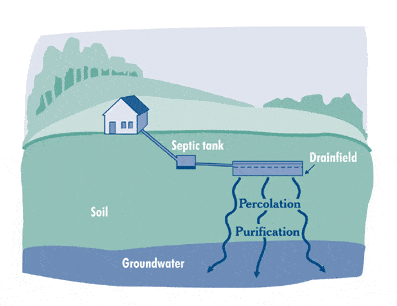Disclosure: This post contains affiliate links, meaning we may earn money or products from the companies mentioned in this post if you purchase a product through one of our links. An example would be Amazon.
What to do if a septic fails inspection?
Are you house-hunting? If so, there is a good chance you will come across a residential property that uses a septic system instead of relying on sewer. As a matter of fact, in many parts of the US, as many as 25% of homes use a septic. When you are buying, selling, or refinancing a home, the last thing you would want is the system to fail inspection.
So, what happens if your septic system fails inspection? If your septic system fails inspection, you should get the problem addressed immediately. If the system is beyond repair, get it replaced. Depending on where you live in the US, you may be able to sell or buy a home with a failed septic system, but keep in mind that it will impact the home’s price.
Keep reading to find out what is a septic inspection, why septic inspection is important, how to prepare for it, and what to do if the septic system fails inspection.
Call Septic Service Pros 1.855-925-0760 For Service or Request a Quote
What is a septic inspection?
A septic inspection, in the simplest terms, is an investigation of a septic system to ensure it is in good working condition and to fix potential problems (if any) before they can cause harm.
A septic inspection can be only visual or it can comprehensive.
A visual septic inspection involves opening the lid of the septic tank, taking pictures, and running a dye test to identify wastewater leakages.
A full inspection involves a visual inspection and more. Apart from removing the tank’s lid and checking the water level inside, the septic inspector will check if the wastewater is draining properly or not. The septic inspector will also check if the water if properly flowing from the house to the tank. He or she will check whether the water level in the tank rises upon receive fresh wastewater. Another thing that will be checked is backflow, a serious problem as well as a health issue.
In short, a visual inspection gives you a basic health report about your septic system’s health while the full inspection delivers a much more comprehensive report. If you want to make sure that your septic system is in perfect order and there are absolutely no blockages, opt for a comprehensive septic inspection.
Why a Septic Inspection is Important
Most experts recommend getting your septic system inspected every 2-3 years. This in turn allows you to ensure the septic tank is clean and in perfect working order. Scheduled septic inspection also helps fix potential problems before they can metastasize into a big issue.
Sadly, not all homeowners follow this advice and have their system inspected only when they start noticing tell-tale signs of a serious underlying issue, like water backing up or a foul smell. Before selling or buying a house or refinancing it, a septic inspection is absolutely necessary and important.
How to Prepare Your Septic System for an Inspection
- Select a licensed septic professional service for conducting the inspection.
- As a homeowner, you should be aware of some basic details regarding the septic tank. These include the year in which the septic system was installed and when you had the last inspection.
- Make a list of all your concerns. If you want to ask the septic inspector questions regarding how to take good care of the septic system, have them ready too.
Call Septic Service Pros 1.855-925-0760 For Service or Request a Quote
How to Pass a Septic Inspection
Here are some hand tips to help you pass a septic inspection:
Sludge
Sludge refers to the solid waste which settles at the bottom of the septic tank. If you had pumped out the septic tank a long time back, sludge can pile up at the bottom and exceed the acceptable levels. Sludge should not be more than one-third of your tank’s volume. Excessive sludge can lead to clogging. The best way to avoid sludge buildup is by having your tank pumped out regularly, at least once every 3 to 5 years depending on the size of the septic tank and your usage.
Scum
If grease or oil enters a tank, scum can stick around in the septic tank. Scum is bad for the bio-environment in your septic tank. That is because it kills the good bacteria, as a result of which solid waste will not get digested efficiently and quickly enough. This in turn can cause sludge to accumulate and exceed the permissible limit.
Flow
If there is no scum or excess sludge, your tank will have a natural flow. If not, issues like backups and clogging will occur, which, if left unchecked or unattended, can cause your entire septic system to collapse. During a septic inspection, the septic inspector will check three main areas: scum, sludge, and flow. If there is a serious problem in one or more of these areas, the septic inspector will not pass your system unless the underlying problems are sorted.
Regular septic inspections and pumping can help you maintain your septic system in a good condition. This way you will not have to worry about any nasty surprises when you have an inspection as part of the home-selling process.
What if the Septic Inspection Fails?
If your septic tank fails, the septic inspector is going to recommend what needs replacing or fixing. Once the underlying issue has been fixed, you can schedule another inspection. In case the septic inspection is for selling or buying a property, you should ask the realtor about how much time you have to take care of this.
A failed septic tank is usually a deal-breaker for many. So, if you are selling a house, you will need to get the issue fixed first.
Can You Sell a House if the Septic System Fails Inspection?
Like many things in life, the answer to this question is, it depends. Some states allow homeowners to sell a house even if their septic system fails inspection, while others do not. But keep in mind that even if you can legally sell a house with a failed septic tank, this will reduce the price. How much price reduction you can expect will depend on how severe the underlying issue is. The cost of replacing a septic tank can easily run into a few thousands of dollars. If the leach field needs to be replaced as well, the price impact will be greater.


